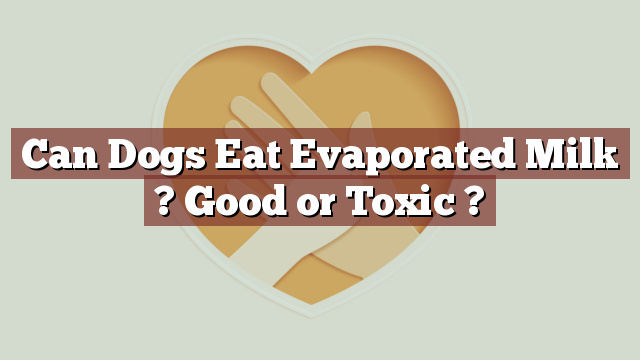Can Dogs Eat Evaporated Milk? Safe or Toxic?
Knowing which foods are safe for our dogs to consume is crucial for responsible pet owners. While some human foods can be harmful or even toxic to dogs, others may provide certain nutritional benefits. One such food that may raise questions is evaporated milk. In this article, we will explore whether dogs can safely consume evaporated milk and consider any potential risks or benefits associated with its ingestion.
Nutritional Value of Evaporated Milk
Evaporated milk is a form of milk that has had about 60% of its water content removed through a heating process. It is commonly used in cooking and baking due to its creamy texture and rich taste. From a nutritional standpoint, evaporated milk is a good source of protein, vitamins, and minerals. It is particularly high in calcium, vitamin D, and vitamin B12. These nutrients are essential for maintaining strong bones, promoting proper cellular function, and supporting the immune system.
Can Dogs Eat Evaporated Milk? Safe or Toxic?
Can dogs eat evaporated milk? The answer is yes, dogs can consume evaporated milk in moderation. While it is generally safe for dogs to consume small amounts of evaporated milk, it is important to note that not all dogs can tolerate dairy products. Many dogs are lactose intolerant, meaning they lack the necessary enzymes to digest lactose, the natural sugar found in milk. This can result in digestive upset, such as diarrhea or stomach discomfort. Therefore, it is crucial to monitor your dog’s reaction to evaporated milk and discontinue feeding it if any adverse symptoms occur.
Potential Risks or Benefits of Dogs Consuming Evaporated Milk
When it comes to dogs consuming evaporated milk, there are both potential risks and benefits to consider. As mentioned earlier, dogs that are lactose intolerant should avoid consuming evaporated milk, as it can lead to digestive issues. Additionally, the high fat content in evaporated milk can contribute to weight gain and potentially lead to obesity, a condition that can pose various health risks for dogs.
On the other hand, if your dog can tolerate dairy products and does not have any specific health issues, evaporated milk can provide certain nutritional benefits. The calcium and vitamin D in evaporated milk can help support bone health, especially in growing puppies or senior dogs prone to bone loss. However, it is worth noting that there are other sources of calcium and vitamin D that may be more suitable for dogs, such as dog-specific supplements or fortified dog food.
What to Do if Your Dog Eats Evaporated Milk?
If your dog accidentally consumes evaporated milk, there are a few steps you can take. Firstly, assess your dog’s overall health and monitor for any signs of digestive upset or allergic reactions. If your dog experiences diarrhea, vomiting, or any other concerning symptoms, it is recommended to contact your veterinarian for guidance. They may advise you to monitor your dog closely at home or bring them in for a check-up, depending on the severity of the symptoms.
Conclusion: Considerations for Feeding Evaporated Milk to Dogs
In conclusion, dogs can consume evaporated milk in moderation, but it is crucial to consider their individual tolerance and overall health. While evaporated milk can provide certain nutritional benefits, such as calcium and vitamin D, it is important to note that not all dogs can digest dairy products without experiencing digestive issues. Therefore, it is advisable to consult with your veterinarian before introducing evaporated milk or any other human food into your dog’s diet. Your vet can provide personalized guidance based on your dog’s specific needs and dietary restrictions.
Thank you for investing your time in exploring [page_title] on Can-Eat.org. Our goal is to provide readers like you with thorough and reliable information about various dietary topics. Each article, including [page_title], stems from diligent research and a passion for understanding the nuances of our food choices. We believe that knowledge is a vital step towards making informed and healthy decisions. However, while "[page_title]" sheds light on its specific topic, it's crucial to remember that everyone's body reacts differently to foods and dietary changes. What might be beneficial for one person could have different effects on another. Before you consider integrating suggestions or insights from "[page_title]" into your diet, it's always wise to consult with a nutritionist or healthcare professional. Their specialized knowledge ensures that you're making choices best suited to your individual health needs. As you navigate [page_title], be mindful of potential allergies, intolerances, or unique dietary requirements you may have. No singular article can capture the vast diversity of human health, and individualized guidance is invaluable. The content provided in [page_title] serves as a general guide. It is not, by any means, a substitute for personalized medical or nutritional advice. Your health should always be the top priority, and professional guidance is the best path forward. In your journey towards a balanced and nutritious lifestyle, we hope that [page_title] serves as a helpful stepping stone. Remember, informed decisions lead to healthier outcomes. Thank you for trusting Can-Eat.org. Continue exploring, learning, and prioritizing your health. Cheers to a well-informed and healthier future!

